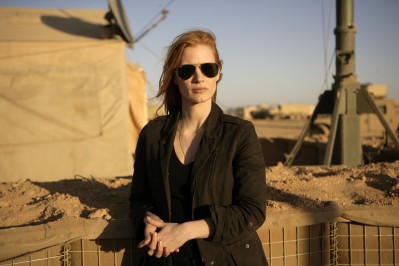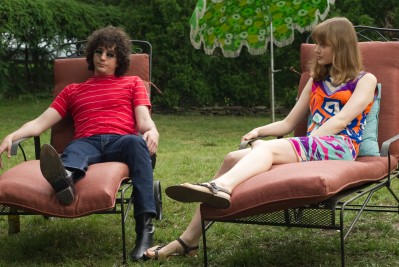 Jessica Chastain is only in her second year in films, and already she’s one of the most commanding actresses of her generation: From her brittle beauty in The Help to carrying her own opposite Brad Pitt and Sean Penn in Tree of Life (two best picture nominees last year that she starred in) to her current part in Zero Dark Thirty, where she shows resolve and vulnerability within the same breath, the depth of her mastery of the film medium is staggering. From the first 30 seconds of director Kathryn Bigelow’s epic examination of the war on terror and the quest for Bin Laden, Chastain engages us with her Jodie Foster-esque inquisitiveness, and for the next two hours, she never lets us go. It’s the kind of performance Oscars were designed for.
Jessica Chastain is only in her second year in films, and already she’s one of the most commanding actresses of her generation: From her brittle beauty in The Help to carrying her own opposite Brad Pitt and Sean Penn in Tree of Life (two best picture nominees last year that she starred in) to her current part in Zero Dark Thirty, where she shows resolve and vulnerability within the same breath, the depth of her mastery of the film medium is staggering. From the first 30 seconds of director Kathryn Bigelow’s epic examination of the war on terror and the quest for Bin Laden, Chastain engages us with her Jodie Foster-esque inquisitiveness, and for the next two hours, she never lets us go. It’s the kind of performance Oscars were designed for.
That’s good, because with her as the anchor, Zero Dark Thirty almost makes sense. If you go by the TV ads, it’s about the on-the-ground hunt for Bin Laden, culminating in the raid by Seal Team 6 nearly two years ago, but really, it’s about the massive intelligence-gathering machine and how it’s a miracle it ever works.
The film is roughly divided into thirds: In the first, we meet the CIA operatives (Chastain’s Maya and Jason Clarke’s Dan, primarily) in the early days after 9/11, as they Abu Ghraib-ify an asset with waterboarding and starvation and humiliation, trying to get usable information. They don’t really know whether he has any, or if their techniques will work; it’s just what they know to do.
But Maya, like good agents (but probably also bad ones), operates on instinct — she’s the smartest woman in the room, and everybody knows it: Maya has an idea about where the rabbit holes lie, and much of the second third is an ambitious and nearly confusing bureaucratic mire over the course of the next eight years: Maya tries to convince her chief that her suspicions are worth pursuing while the war goes poorly in the media at home; her colleagues move on, or make fatal mistakes of judgment; Saudi royals are bribed with racecars for information. But don’t worry about getting lost during this extended Act 2 — just allow the energy of the film to wash over you until the masterfully staged raid in Pakistan that caps the movie. (It gives you a newfound understanding for the logistics of what seemed at the time like a Rambo moment but which was far more technical, even prosaic, than you would imagine.)
The final third is where Bigelow proves her bona fides, but even in the messy lead-up to it, Zero Dark Thirty captivates like a ’70s-era political thriller. (It feels like Argo without the bad haircuts.) The script, by Hurt Locker scribe Mark Boal, eschews deep discussions of Pakistani-American politics (and the term “Seal Team 6” is never used). In concentrates, rather, on the stress related to information lag, and how confirmation bias leads many agents to champion theories even after they should know better. And Bigelow delivers some hot Navy SeALs for us to gawk at. (“I’ve seen to many guys naked,” says Dan about retiring; uh-huh.)
Like The Hurt Locker, Bigelow and Boal have made a flawed film, but one that sticks with you. And by putting Chastain in the hot-seat, it adds a human component that all the macho posturing cannot.
 The difference between a pastiche and a hodgepodge is this: A pastiche melds disparate elements into a cohesive whole to create something fresh; a hodgepodge is the collision of those same elements into a mess. That’s what happens in Not Fade Away, the feature film directorial debut (at age 67!) of Sopranos creator David Chase. Within the first 90 seconds, we’re exposed to a grainy Kinescope of a rock appearance on ‘50s TV, a seemingly unrelated black & white meeting between two British lads, a cold jump in space and time to somewhere in the U.S. and a voice over narrator who will then disappear for more than an hour, before returning in the last moments to address the camera. If ever there was a movie that didn’t know what it wanted to be, Not Fade Away was it.
The difference between a pastiche and a hodgepodge is this: A pastiche melds disparate elements into a cohesive whole to create something fresh; a hodgepodge is the collision of those same elements into a mess. That’s what happens in Not Fade Away, the feature film directorial debut (at age 67!) of Sopranos creator David Chase. Within the first 90 seconds, we’re exposed to a grainy Kinescope of a rock appearance on ‘50s TV, a seemingly unrelated black & white meeting between two British lads, a cold jump in space and time to somewhere in the U.S. and a voice over narrator who will then disappear for more than an hour, before returning in the last moments to address the camera. If ever there was a movie that didn’t know what it wanted to be, Not Fade Away was it.
You can feel the desperation pulsing through the screen; in his career twilight, Chase has what may be his only shot to tell an epic, personal story (the autobiographical elements are obvious, from the Italian-American upbringing in New Jersey to the move to a career in SoCal), and he bites off more than he can chew. His hero, Douglas (John Magaro), longs to be Mick Jagger, but as the opening narration tells us, this group never hits it big. So we are left to spend two hours watching dreams not come true, as other ones replace them.
Jumpy, and with a timeline that makes no sense, Not Fade Away recalls Kenneth Lonergan’s Margaret in its sincere ambition accompanied by abject failure.
















